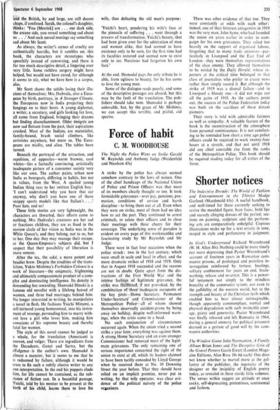Force of habit
C. M. WOODHOUSE
The Night the Police Went on Strike Gerald W. Reynolds and Anthony Judge (Weidenfeld and Nicolson 45s) A strike by the police has always seemed somehow contrary to the laws of nature. One of the chief handicaps of the National Union of Police and Prison Officers was that most of its members clearly thought so too. It took formidable grievances—over pay, pensions, pro- motion, conditions of service and harsh discipline—to bring them out at all. Even when they were on strike, most of them had no idea how to act the part. They continued to arrest criminals, to salute their officers and to close their meetings with three cheers for their sovereign. The underlying sense of paradox is evident on every page of this workmanlike and fascinating study by Mr Reynolds and Mr Judge.
There were in fact four occasions when the police struck : two in the last century, which were small in scale and local in effect, and the more dramatic strikes of 1918 and 1919. Only that in August 1918 succeeded and the reasons are not in doubt. Quite apart from the dis- tractions of the First World War and the intense feelinis of legitimate grievance, the strike was fa'diffiated, if not provoked, by the combination- Of-three' inadequate occupants of the key posts—Horne Secretary, Permanent Under-Secretatr and Cdmmissioner of the Metropolitan Policed—all• of whom showed themselves deservedly accident-prone by, being away On holiday, despite well-informed warn- ings, when the crisis came to a head.
No such conjunction of circumstances occurred again. When the union tried a second stroke a year later, everything was against them. A strong Home Secretary and an even stronger Commissioner had removed most of the legiti- mate grievances. The only remaining one of serious importance concerned the right of the union to exist at all, which its leaders claimed to have been tacitly conceded by Lloyd George when he received them at No. 10 Downing Street the year before. That they should have relied on an implicit promise, never put in writing, by that wily operator, was clear evi- dence of the political naivety of the police organisers. There was other evidence of that too. They were constantly at odds with each other: indeed, one of their bitterest antagonists in 1919 was the very man, John Syme, who had founded the union six years earlier in order to cam- paign for his own grievances. They relied too heavily on the support of organised labour, forgetting that to many trade unionists—par- ticularly in Liverpool and the East End of London—they were themselves representatives of the class enemy. They allowed themselves to be misled by the Daily Herald, whose re- porters at the critical time belonged to that class of journalists who prefer to create news rather than simply record it. But although the strike of 1919 was a dismal failure—and in Liverpool a bloody one—it did not wipe out all the gains of 1918. As the authors point out, the success of the Police Federation today was built on the sacrifices of these distant pioneers.
Their story is told with admirable fairness as well as sympathy. A valuable feature of the book is the reconstruction of the atmosphere from personal reminiscences. It is not comfort- ing to be reminded how short a time ago police officers could be required to work twenty-four hours at a stretch, and that not until 1918 did any chief constable rise from the ranks of the Metropolitan Police. This book should be required reading today for all critics of the force.






































 Previous page
Previous page